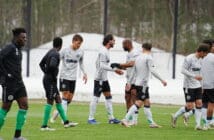
Didier Drogba is potentially leaving Montreal for a role with Chelsea. Photo taken by Kari Heistad
by Matt Hoffman
Columnist Ana Swanson writing in the Wonkblog section of the Washington Post offered some timely advice on how to have a great New Years party: lower your expectations.
In a 1999 study called “The pursuit and assessment of happiness can be self-defeating,” Jonathan Schooler, now of the University of California Santa Barbara, Dan Ariely of Duke University and George Loewenstein of Carnegie Melon offer evidence that those who plan to have a great time on New Year’s Eve are likely to be the most miserable of all.
The study surveyed just under 500 people before and after New Years and found that those with the highest expectations also tended to be the most disappointed. Conversely, to paraphrase SNL alum Jon Lovitz, the key to happiness is lowered standards.
No one should heed this advice more than the Montreal Impact. The team at the bottom of MLS in 2014 were mired again toward the bottom in 2015 before the team hitched their wagon to Didier Drogba whose stellar play nearly carried Montreal to the MLS Cup Final.
Recent events have conspired to potentially keep Drogba’s MLS stay a short one. Amid the leadership vacuum at Chelsea, Drogba has been called upon as a potential coach. Montrealresponded to this pre-holiday news as well as they could: “We are willing to accommodate him. But our objective is to have him back for another season, as agreed in his contract.”

Current Chelsea coach Gus Hiddink reiterated that Drogba is under contract with Montreal, one which Chelsea respects.
However no team wants a player, no matter how talented, whose heart lies elsewhere. Unlike other clubs with cash flow issues, Chelsea remain awash in capital having the funds to have 33 players on loan. Consider that per current rules, an MLS team can only field a team consisting of 28 players.

Montreal is coming around to the possibility of a Drogba exit. Though owner Joey Saputo and his front office staff would be loath to admit this publicly, this is the best possible scenario for the Montreal Impact. Photo by by Kari Heistad.
The Ivorian’s run at Montreal was as amazing as it was unsustainable. The 37-year-old’s body held out well for him to play eleven regular season games (plus three playoff matches) but it is beyond the pale to believe that he could weather a full year MLS play without diminishing returns.
Drogba’s twelve goals in fourteen matches is an efficiency mark that this league will likely never see again. Ask Vancouver’s Octavio Rivero. The Uruguayan striker had five goals through his first five games but could only muster two goals as his team chased at a playoff spot in their final twelve games.
Chelsea, well aware of Drogba’s limitations, only played the striker 90 minutes three times since the start of the 2014/2015 Premiership: One October match and twice for Cup matches. Drogba is well above the wrong side of 30; Montreal can’t expect to of the wear and tear of MLS, a league known for physicality and extensive travel.
Keep in mind that England, at 93,278 square miles, is smaller than Oregon (98,466).

Drogba cannot expect his body to last a full MLS season. Photo by Kari Heistad
Finally, don’t expect Drogba to be the sort of “locker room leader” either. The narrative of the sage, and wily veteran lending wisdom, guidance, and encouragement to a younger generation is a great narrative but hardly anything about Drogba’s off-the-field incidents and his personality suggest that is a role he would take gracefully at any club.
With the possible exception of Chelsea, who have made Drogba’s return a big selling point to the fans leaving Montreal in the rare position of an MLS club having leverage over an English giant.
Cash is certainly one thing that Montreal can exert from Chelsea but is somewhat short-sighted especially as MLS would expect a cut. There are other, more efficient, ways Montreal can turn this to a positive:
-
Loans: Chelsea has a stable of world-class talent. Why not use that to bolster your squad in the short-term without a salary cap hit?
-
Mid-season friendlies: The MLS-faithful hate to admit, but friendlies against a club’s fourth and fifth tier players is a marketing bonanza.
-
Data: Chelsea, like most major European teams, are fitted with a state-of-the-art scouting and analytics departments. Maybe the team can CC: the Impact with a few scouting reports.
-
A “special relationship”: An amalgam of the above ideas. Use the Drogba acquisition to cement an ally at one of the most notable–and formidable–clubs in all of soccer.
Montreal has the opportunity to convert its short term spark into a viable source of long term revenue and support for a club that many consider to have the weakest infrastructure in the league. Let’s hope Montreal can curtail their 2016 expectations in exchange for long term, sustainable success.
![Prost International [PINT]](https://prostinternational.com/wp-content/uploads/2021/08/PINTtFontLogoRoboto1536x78.jpg)


